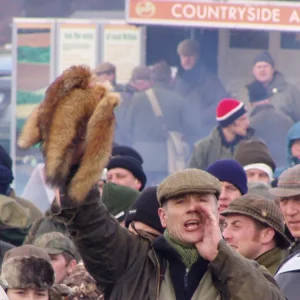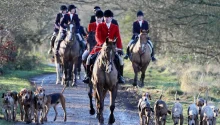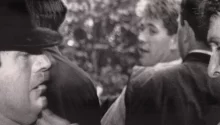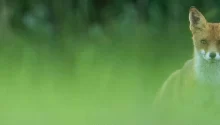By John Bryant
Some hunters claim they preserve foxes: others claim they hunt in order to destroy ‘vermin’. A recent article written by a former Master of Foxhounds demonstrates the muddled thinking and twisted ethics of the foxhunter.
Lord Mancroft is Vice-Chairman of the British Field Sports Society, former Master of the Vale of White Horse Fox Hounds and a self-confessed former heroin addict. In The Field last December, he wrote an article describing a day out following the Vale of White Horse Hounds. It provides an extraordinary insight into the hunting mind and the inconsistencies of the hunters’ arguments.
Mancroft starts the story by describing how he rode on ahead of the hunt to prevent a herd of bullocks getting in amongst the hounds. Then he and his fellow hunters enjoyed a ‘sharp twenty minutes’ gallop in pursuit of the fox which left horses and riders ‘well-blown’ before the hounds temporarily lost the scent.
While the hounds searched for the scent Mancroft cantered on ahead. With his horse panting and him ‘puffing’ he stopped at the edge of a small copse. He then saw the fox moving slowly through the dead leaves towards him and lie down.
“He waved his brush from side to side through the leaves, like a cat, and panted. His tongue was hanging out and his sides heaved, and there was no doubt in my mind that this fox had done some work,” wrote his persecutor.
Then Lord Mancroft saw the hounds slowly working towards where the fox lay and he realised that the dogs were out of sight and out of earshot of the panting animal. He surmised that soon it would be too late for the fox to escape death and so he cleared his throat and spoke to the fox. “The fox whipped round and fixed me with his incredibly sharp, expressionless vulpine eyes, more like a cat than a dog,” he wrote.
Then, according to Mancroft, the fox “skipped off” towards the hounds and “jinked the whole way through the pack” across 50 yards of old turf and into some woodland with the hounds in full cry behind him. The Lord rode off to try and get to the other side of the wood but was confronted by a locked gate. As he waited, trying to make up his mind what to do, he saw the fox running towards him.
“He was coming slowly through the wood towards the spot I had just left, and he had changed considerably. His head was down, his brush was down and there was little doubt that he was in trouble.”
Lord Mancroft described how he watched as the fox slipped through the fence and down towards the river, where he disappeared.
“I galloped parallel to his route, 100 yards up the hill, to where I hoped I would be able to see him re-emerge,” enthused the hunting Lord. Then he spotted the fox again as it emerged from the riverbank, crossed a bridge and started to climb a steep hill. As the pack followed, the fox side-stepped and slipped back past the hounds, down the hill and jumped into the river. But the weight of the water in his coat slowed him down: the hounds, having heard the splash behind them, turned to attack.
Lord Mancroft described the last moments. “Still he might have made it, but he did not have the strength to pull himself up the bank quickly enough and he was bowled over and killed not 10 yards from where I sat on my horse. I think, at the end he turned and bared his teeth at his executioners, but that may be wishful thinking on my part. My sadness at this death was quickly swamped by the excitement of the moment, and I was the first to congratulate a broadly grinning huntsman on a good job well done.
The Lord Mancroft added, “He was a good fox, a game, brave fox, and I can only be saddened at his death, however much I rejoice in the successful conclusion of the hunt, or revel in the exhilaration of the chase. There is no doubt in my mind that he was neither “distressed” nor “stressed” during the hunt… As the dominant species, we have the responsibility to maintain a healthy balance whether we like it or not, and that gives us the duty to encourage life where we can, and take life where we must.”
I have no doubt that the readers of Wildlife Guardian will be as shocked as I was when I first read this man’s words of staggering callousness, hypocrisy and self-deception. Most people who ride to hounds never see or wish to see a fox die and only go along for the ride. Not so Lord Mancroft. He claims that he kills foxes because it is duty to take their lives. And yet at one stage of the hunt he reneged on this ‘duty’ and alerted the fox to his presence so that it would have a chance of escaping death – only for him to cause the animal even more suffering. He described the fox at various stages of the chase – firstly lying down, sides heaving and tongue hanging out, then later ‘in trouble’ with its head down and brush down. And at the end he described how the fox was so exhausted that it did not have the strength left to climb a bank and was grabbed and bitted to death by the hounds.
How any intelligent person can describe such scenes and then state that at no time was the fox distressed or stressed, is beyond my comprehension.
So this is the sort of person who is running the British Field Sports Society; a person who cannot recognise cruelty even when his own words describe it perfectly. Lord Mancroft may believe that it is his ‘duty’ to take the lives of animals and to congratulate ‘grinning’ huntsmen on hounding animals to death, but I am sure his article convinces you as well as me that our ‘duty’ is to carry on campaigning until Lord Mancroft’s perverse ‘duty’ is rendered a criminal offence!
Source: LACS Wildlife Guardian






